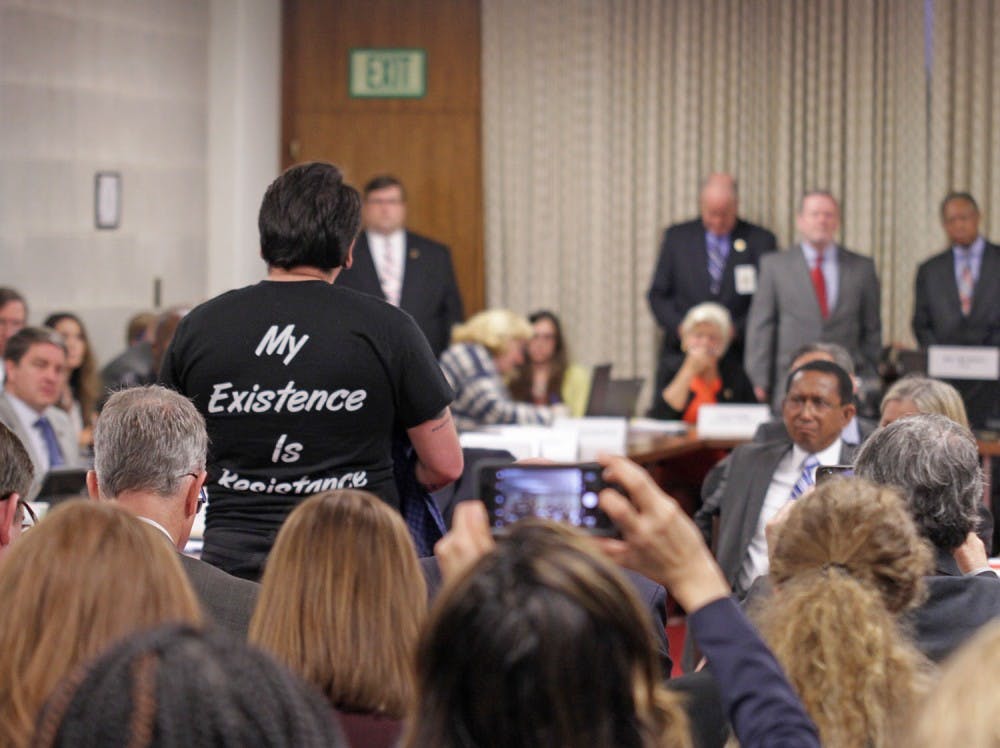‘I don’t think it goes far enough’
Sen. Dan Blue, D-Wake, said no compromise is perfect. A December bill that proposed a similar, shorter moratorium on non-discrimination ordinances failed to pass in the General Assembly. But this time, even with a longer moratorium period, Blue said the issue was too urgent to vote against.
N.C. Senate President Pro Tempore Phil Berger, R-Rockingham, said the bill is good for the state right now, though he recognized that not everyone felt that way.
“I don’t know if there are that many people who are extremely happy about where we are,” Berger said on the Senate floor.
Despite a series of failed repeal attempts, Cooper spoke strongly in the news conference.
“I believe with all my heart that this is the right thing to do,” he said. “I thought about it; I prayed about it; I talked to many people about it.”
Rep. Yvonne Holley, D-Wake, who eventually voted for the bill, called the vote gut-wrenching.
“I am torn apart, because I want to support my governor,” she said in a House debate.
But support for the governor did not similarly dictate Butler’s vote.
“I will say that the governor, who I greatly admire, worked very hard to put this bill together in an effort to repair our reputation,” she said. “I don’t think it goes far enough to protect LGBT citizens.”
During the House debate, she emphasized she’s part of a community that will be primarily affected by the law.
To get the day's news and headlines in your inbox each morning, sign up for our email newsletters.
“We would rather suffer HB2 than to have this body deny us — one more time — the true and unfettered protections of the law,” Butler said.
The NCAA impact
The NCAA set a Thursday deadline for an HB2 repeal in order for the state to make a bid for championship events from 2018 to 2022.
Andrew Reynolds, a UNC political science professor, said the vote was explicitly driven by the deadline.
“One would assume that the North Carolina leaders would have spoken to the NCAA and worked out what they needed to do to get the NCAA to rescind their ban,” he said. “So I would be amazed if they were dumb enough to do this without getting it cleared with the NCAA.”
Clinton Wright, an activist from Durham protesting Thursday, said the bill is not what North Carolinians have been fighting for.
“For the NCAA to have our politicians’ ears more than the people of North Carolina is highly problematic,” he said.
Joaquín Carcaño, a UNC-Chapel Hill employee and a plaintiff in the ACLU suit against HB2, said the law passed Thursday is a replacement, not a repeal.
“This bill sacrifices our lives and safety for the sake of basketball,” he said.
Margaret Spellings, UNC-system president, said in a statement she expects the system will be able to host national athletic events again.
Discussion of championship sites can reopen; John Swofford, ACC commissioner, said in a statement.
“This discussion will take place in the near future, and following any decisions by the ACC Council of Presidents, announcements will be forthcoming,” he said.
‘We’re going back to square one’
James Miller, executive director of the LGBT Center of Raleigh, said no one’s civil rights should be put to a vote.
For Reynolds, the bill is a slight step forward, but one that was not worth the dangerous message of continued inequality it sent to the LGBTQ community.
“Their rights are to be negotiated away,” he said. “Their rights, on their behalf, are to be compromised away.”
Carcaño, who spoke in the Senate Rules Committee discussion of the bill, said the rest of the country will continue to fight back.
“Our lives are not to be bargained with,” he said.
Butler said the legislature is left where it was before.
“We are extremely polarized,” she said. “To say otherwise would be untruthful.”
While some view the bill as a legislative reset, Reynolds said before HB2, the status quo was unacceptable. Transgender kids were getting bullied, attempting suicide, he said.
“We’re going back to square one, and square one was unacceptable.”
state@dailytarheel.com




